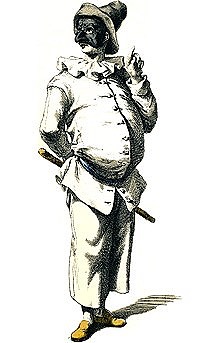ParodyProductions

Book illustration of Pulcinella in 1700 (1860) by Maurice Sand
" … we're each seemingly blessed with this bottomless ability …"
My first enlightenment came with a frightening realization. I really felt as though I had been successfully passing for what I deeply felt I simply had to be. I caught myself behaving as the self I'd convinced myself I simply had to be, and I, in that moment, saw right through my flimsy facade. I felt in that humbling moment, deeply ashamed at how I'd managed to game myself into that condition. I felt deep contrition, but had yet to understand who else I might pass myself off as being. I had known almost forever that nobody would ever accept the me I once knew to be most representative of myself, that I could publicly be anyone else, but never myself, one Hell of a deeply false premise. And so had begun my first and probably greatest ParodyProduction of my life. I've been living down that performance ever since. ©2020 by David A. Schmaltz - all rights reserved
A parody begins with a slightly twisted premise and over time tends to turn into a really bad episode of The I Love Lucy Show. It requires no more than the merest twist to get started, and the simplest repetition to amplify its effects. A one degree drift from the very start eventually produces a very different destination. One misconception can produce tons of manure once it matures into a lifestyle. I still find myself cleaning up messes my initial life misconception produced. After sifting through an array of alternate responses to my self-inflicted dilemma, I came to the most unlikely of all conclusion. I could just strive to become the one I always knew myself to be, even that one I knew so well before engaging in my life-long parody, that one I had convinced myself I could never publicly become.
Nobody cares, least of all me, how any personal parody began. I insist that simple misconception begat it, and while I'm certain that multiple subtle forces encouraged it, I do not believe that revisiting those choices could possibly reverse their past influences. No, I sensed in that first moment of recognition, that I'd be better off just moving into an alternate conception, which itself might later prove to have been a misconception. It might well be, I thought then and continue to believe today, that anyone's path remains largely defined by misconceptions, every inch of the way. Some, perhaps, less self-destructive that others, but each ultimately in need of some remedial re-conception. "I screwed up," might serve as the most useful admission.
I last night caught us, The Muse and I, in the initial stage of a fresh ParodyProduction, all, of course, the very soul of well-intended, but nonetheless certainly sowing seeds of its own ultimate comeuppance, perhaps even its own destruction. Each fresh production seems to carry the self-same cues. An event occurs. Someone responds in what certainly seems like an appropriate way at the time, except some slight further complication quickly emerges. A swell of human kindness informs another response, and the siphon's already started. A slowly-building cascade of utterly unintended consequences sparks even more generous responses. An unseen train has begun slowly rolling toward another equally slow-rolling one while no one senses any motion. In that moment, a future train wreck's guaranteed, but nobody could possibly see it coming. Focusing upon the ever more complicating conditions, each of which, taken in imaginary isolation, prompt perfectly reasonable responses. At some point, there's suddenly no going back. It's ever forward, ever onward, an ever downward spiral. By then, we're committed to riding it to the end, which might well never come. One never, ever finds any opportunity to return back into the former state, that one you warmly remember as the way it used to be. Anyway, I caught us entering this tunnel of doom and might have slowed an otherwise inexorable regression. It might not ever get any better than this!
It's ever onward in this world, never backward to anywhere. A parody, once begun, need not run its full course, but it's already done some damage by the time its presence gets recognized. What then? What Now? Some choices, each appearing distinctly unsatisfactory, usually appear, though nobody's feeling very much like cheering about them then. Compared to the building regression of the freshly recognized ParodyProduction, though, seemingly better choices emerge. Resolution seems altogether too cloaked in humiliation to ever prove satisfactory. Some shame might accompany. Still, genuine progress comes almost exclusively colored like this: a misconception discovered, a clumsy recovery, a flush of shame, a response of forgiveness, and we choose to go on. The alternatives all seem worse, and while some might argue that they're especially cursed, we're each seemingly blessed with this bottomless ability to temporarily turn our lives into ParodyProductions. We learn to forgive ourselves and move forward or we will not move on.


